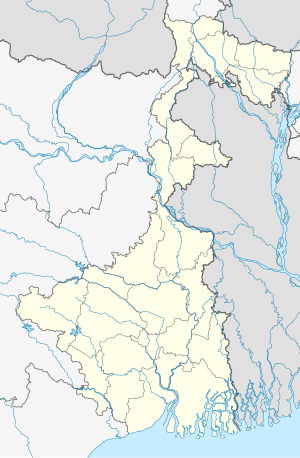Tulshighata
Tulshighata | |
|---|---|
Census Town | |
| Coordinates: 22°09′24″N 88°27′26″E / 22.1566°N 88.4573°E | |
| Country | |
| State | |
| District | South 24 Parganas |
| CD block | Jaynagar II |
| Area | |
| • Total | 2.54 km2 (0.98 sq mi) |
| Elevation | 8 m (26 ft) |
| Population (2011) | |
| • Total | 4,366 |
| • Density | 1,700/km2 (4,500/sq mi) |
| Languages | |
| • Official | Bengali[1][2] |
| • Additional official | English[1] |
| Time zone | UTC+5:30 (IST) |
| PIN | 743338 |
| Telephone code | +91 3218 |
| Vehicle registration | WB-19 to WB-22, WB-95 to WB-99 |
| Lok Sabha constituency | Jaynagar (SC) |
| Vidhan Sabha constituency | Jaynagar (SC) |
| Website | www |
Tulshighata is a census town within the jurisdiction of the Jaynagar Majilpur police station in the Jaynagar II CD block in the Baruipur subdivision of the South 24 Parganas district in the Indian state of West Bengal.
Geography
M: municipal city/ town, CT: census town, R: rural/ urban centre, N: neighbourhood, H: historical place/ religious centre
Places linked with coastal activity are marked in blue
Owing to space constraints in the small map, the actual locations in a larger map may vary slightly
Area overview
Baruipur subdivision is a rural subdivision with moderate levels of urbanization. 31.05% of the population lives in the urban areas and 68.95% lives in the rural areas. In the southern portion of the subdivision (shown in the map alongside) there are 20 census towns. The entire district is situated in the Ganges Delta and the southern part is covered by the Baruipur-Jaynagar Plain. Archaeological excavations at Dhosa and Tilpi, on the bank of the Piyali River indicate the existence of human habitation around 2,000 years ago.[3][4][5]
Note: The map alongside presents some of the notable locations in the subdivision. All places marked in the map are linked in the larger full screen map.
Location
Tulshighata is located at 22°09′24″N 88°27′26″E / 22.1566°N 88.4573°E. It has an average elevation of 8 metres (26 ft).
Raynagar, Kalikapur Barasat, Baharu, Uttarparanij, Alipur and Uttar Durgapur, all in the Jaynagar I CD block, are adjacent to Jaynagar Majilpur. Nimpith and Tulshighata, both in the Jaynagar II CD block, are very close to Jaynagar Majilpur. These nine locations (eight census towns and a municipal city) virtually form a cluster.[6]
Demographics
According to the 2011 Census of India, Tulshighata had a total population of 4,366, of which 2,244 (51%) were males and 2,122 (49%) were females. There were 416 persons in the age range of 0 to 6 years. The total number of literate persons in Tulshighata was 3,311 (83.82% of the population over 6 years).[7]
Infrastructure
According to the District Census Handbook 2011, Tulshighata covered an area of 2.5423 km2. Among the physical aspects, there is a railway station at Jaynagar Majilpur 5 km away. Among the civic amenities, the protected water supply involved overhead tank. It had 390 domestic electric connections. Among the medical facilities it had was a hospital 2 km away. Among the educational facilities it had were 5 primary schools, 3 middle schools, 1 secondary school, 1 senior secondary school, the nearest general degree college at Dakshin Barasat 12 km away. Important commodities it produced were grill, paddy.[8]
Transport
Jaynagar-Jamtala Road links Tulshighata to the State Highway 1.[9]
Jaynagar Majilpur railway station is located nearby.[9]
Education
Tulshighata Jagatbandhu Institution.[10]
Healthcare
Sri Ramakrishna Rural Hospital, with 30 beds, at Nimpith, is the major government medical facility in the Jaynagar II CD block.[11]
References
- ^ a b "Fact and Figures". Wb.gov.in. Retrieved 5 July 2019.
- ^ "52nd REPORT OF THE COMMISSIONER FOR LINGUISTIC MINORITIES IN INDIA" (PDF). Nclm.nic.in. Ministry of Minority Affairs. p. 85. Archived from the original (PDF) on 25 May 2017. Retrieved 5 July 2019.
- ^ "District Statistical Handbook 2014 South Twety-four Parganas". Table 2.1, 2.2, 2.4b. Department of Statistics and Programme Implementation, Government of West Bengal. Retrieved 5 December 2019.
- ^ "Census of India 2011, West Bengal, District Census Handbook, South Twentyfour Parganas, Series – 20, Part XII-A, Village and Town Directory" (PDF). Page 13, Physiography. Directorate of Census Operations, West Bengal. Retrieved 5 December 2019.
- ^ "District Human Development Report: South 24 Parganas". Chapter 9: Sundarbans and the Remote Islanders, p 290-311. Development & Planning Department, Government of West Bengal, 2009. Archived from the original on 5 October 2016. Retrieved 5 December 2019.
- ^ "Census of India 2011, West Bengal, District Census Handbook, South Twentyfour Parganas, Series – 20, Part XII-A, Village and Town Directory" (PDF). Page 699 - Map of Jaynagar I CD block, Page 725 – Map of Jaynagar II CD block. Directorate of Census Operations, West Bengal. Retrieved 30 November 2019.
- ^ "CD block Wise Primary Census Abstract Data(PCA)". West Bengal – District-wise CD blocks. Registrar General and Census Commissioner, India. Retrieved 11 November 2019.
- ^ "District Census Handbook South Twenty Four Parganas, Census of India 2011, Series 20, Part XII A" (PDF). Section II Town Directory, Pages 999-1006 Statement I: Status and Growth History, Pages 1006-1010; Statement II: Physical Aspects and Location of Towns, Pages 1010-1015; Statement III: Civic and other Amenities, Pages 1015-1019; Statement IV: Medical Facilities 2009, Pages 1019-1027 Statement V: Educational, Recreational and Cultural Facilities, Pages 1027- 1029:Statement VI:Industry and Banking. Directorate of Census Operations V, West Bengal. Retrieved 28 November 2019.
- ^ a b Google maps
- ^ "Tulsighata Jagatbandhu Institution". Swayangsiddha. Retrieved 21 December 2019.
- ^ "Health & Family Welfare Department" (PDF). Health Statistics – Rural Hospitals. Government of West Bengal. Retrieved 11 November 2019.

